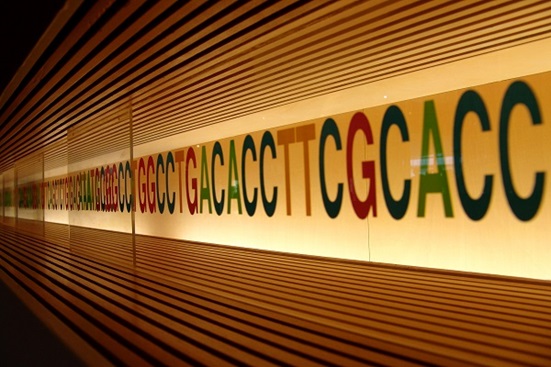
Credit: Miki Yoshihito
Direct-to-consumer (DTC) DNA tests were popular gifts this past holiday season. The tests’ makers promise the ability to sketch out details about customers’ family trees, but some results may also include a swath of information related to your genetic risk of diseases such as age-related macular degeneration and Parkinson's disease. If you have just recently returned your sample (like me, basically spitting in a tube produces enough DNA to sketch out details for your family tree) or have already received your results, it’s important to understand the information contained in the results and how to appropriately interpret your risk.
For me, the main draw for engaging in this exercise was to see what I might learn pertaining to my well-known family history of cardiovascular disease. I was first tested in my early 30s for my cholesterol level after my dad, then 55, had two heart attacks in 10 days. (He was a smoker since age 14 and had very high cholesterol.) The physician who explained my blood lipid profile – which includes both HDL and LDL, or “good” and “bad” cholesterol, respectively, plus triglycerides – told me that my levels looked like that of a man in his 50s about to have a heart attack. In other words, just like my dad.
The web site for the consumer kit I used stated that my results would not include reports on hereditary risks for some adult-onset diseases like cancer, diabetes, and heart disease. However, they would measure “wellness” characteristics such as genetic weight, deep sleep, and caffeine consumption.
My results won’t be in for another few weeks, but in the meantime, I checked in with a few Penn Medicine geneticists and cardiologists to learn more about these DTC kits and whether any on the market today contain information that could play a role in predicting general heart disease risk. Reed Pyeritz, MD, PhD, the William Smilow Professor of Medicine and a professor of Genetics, confirmed my suspicions that true heart-disease-risk tests are available only from specialty labs.
“Lots of commercial labs have panels of genes dedicated to specific disorders or groups of disorders,” Pyeritz said. “For example, a test I frequently order has 23 genes that, when mutated, can predispose a patient to aortic disease.” He added there are other tests that detect predispositions to cardiomyopathy, rhythm disorders, and other genetically based heart issues. As a rule of thumb, he says, any person with a close relative who developed or died of a cardiovascular disease early – males younger than 50 and females younger than 60 – should have a work-up for a genetic predisposition.
The new Penn Center for Inherited Cardiovascular Disease, directed by cardiologist Anjali Owens, MD, is dedicated to just that population. In fact, another post this month describes the story of Penn patient Krysten Ollice who lost her mother when she was only 48 to hypertrophic cardiomyopathy, a thickening of the heart muscle. Krysten was diagnosed with the same disease when she was 17. Her sister does not carry the mutation, and so far, Krysten’s son, Cameron hasn’t shown signs of the condition. Krysten’s family is a case in point for knowing your family history.
For the dedicated consumer, Kiran Musunuru, MD, PhD, an associate professor of Cardiovascular Biology, says that “in principle, and with the help of an expert, one could download and use the raw data offered by commercial test kits and calculate a cardiovascular risk score. The latest risk scores are becoming increasingly more useful.” In fact, the journal he edits, Circulation: Genomic and Precision Medicine, shared a video on genetic risk.
However, for most people jumping on the DNA kit bandwagon, Penn Medicine experts have a few general tips to share.
What does a positive result for a genetic risk variant really mean?
“If a person is positive for a certain genetic risk variant or trait, it likely means your risk is higher compared to the general population,” said Arupa Ganguly, PhD, a professor of Genetics. “For a disease that affects 1 in 100 individuals during their lifetime, a genetic risk factor that increases the risk two-fold, will change to 1 in 50. While the relative risk is increased, the absolute risk does not change much.”
Steve Joffe, MD, MPH, a professor of Medical Ethics and Health Policy, was interviewed by KYW a few months ago saying that results from DTC DNA kits shouldn’t cause panic for consumers: “You might be at an elevated risk of Alzheimer’s or Parkinson’s. You certainly should be talking to your doctor, genetic counselor, or somebody who can help you interpret that information – put it in context.”
Who should I go to for help in interpreting results?
“Seeking medical advice for results that have health implications is very important,” said Dan Rader, MD, chair of the department of Genetics. “Unfortunately, many physicians do not have the appropriate expertise. Seeking out a genetic counselor can be a good start but is difficult to access without going through a physician.”
“I think the challenge, and we need solutions to it,” said Angela Bradbury, MD, an assistant professor of Hematology/Oncology in an article on DTC testing in HemOnc Today, “is that there are many patients who don't have access to genetic counselors and if there’s a patient who is in an area where the nearest academic center or nearest genetic counselor is 2 hours away.”
Is there anything I can actually do if I get a concerning result?”
“Only a few variants on DTC genetic testing are medically actionable,” Rader said. “But as DTC genetic testing expands to whole-exome sequencing, the frequency of medically actionable results will increase.” Earlier this year, Pyeritz told 6ABC that he thinks the tests may be helpful in motivating people to make healthy changes in their lives.